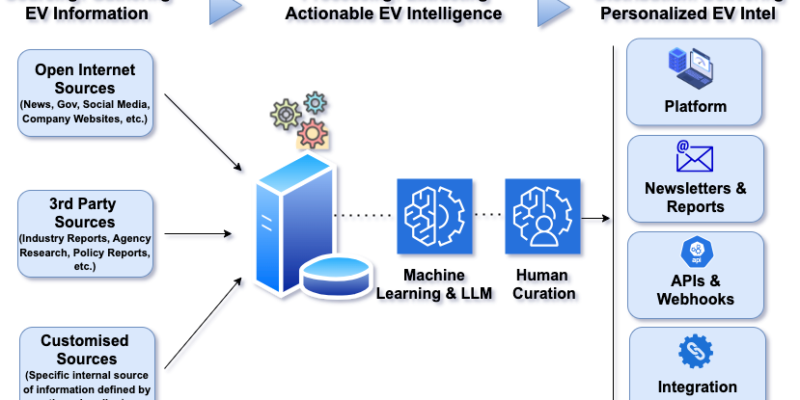In Electric Vehicle Brief we designed a methodology to gather, refine and deliver actionable intelligence related to the electric vehicle industry.
1. Sourcing: Gathering EV Information
- Standard Sources:
- News Outlets: Major news publications and specialized EV news sites.
- Industry Publications: Trade journals and industry-specific newsletters.
- Company Announcements: Press releases and investor relations pages of EV manufacturers, charging infrastructure companies and relevant technology providers.
- Government and Regulatory Bodies: Look for policy changes, regulations and other announcements.
- Patent Databases: To track technology innovations.
- Social Media: Track key influencers, analysts, and companies on platforms like Twitter, LinkedIn, and YouTube.
- Market Research Reports: Reports from firms like McKinsey, Deloitte, Bloomberg, Wood Mackenzie, etc.
- Customized Sources (Your Own Data): Internal reports, sales data and any proprietary information.
- Aggregation:
- RSS Feeds: Subscribe to RSS feeds from news sources and blogs.
- API Integration: Utilize APIs from data providers (if available) for structured data delivery.
- Manual Collection: For sources that are not easily automated, designate personnel to monitor and collect relevant information.
2. Processing: Extracting Actionable EV Intelligence
- Data Annotation with EV Brief Taxonomy using Machine Learning and Large Language Model
- Data Cleaning and Standardization
- Tagging by Topic: Categorize stories into New Products/Services, Government/Regulatory, Production/Operations, Capacities/Facilities, Sales, etc.
- Tagging by Location: Label content based on geographical references (e.g., USA, Europe, China, India, etc).
- Tagging by Content Type: Classify information as News, Research Reports, Patents, Press Releases, etc.
- Tagging by Person (Key Individuals & Executives) Use Named Entity Recognition (NER) and Knowledge Graphs to identify CEOs, policymakers, scientists and industry leaders.
- Sentiment Analysis:
- Determine the sentiment (positive, negative, neutral) associated with different topics and companies.
- Trend Identification:
- Analyze data over time to identify emerging trends, shifts in market dynamics, and technological advancements.
- Look for patterns in investments, policy changes, and consumer behavior.
- Summarization and Abstraction:
- Condense large amounts of information into concise summaries and key takeaways.
- Human Editors in Curation
- Validate and refine AI-generated tags to ensure accuracy, relevance, and context-specific correctness.
- Resolve ambiguities and biases that AI may introduce, especially in complex or nuanced news stories.
- Enhance quality control by adding editorial insights, verifying sources, and ensuring compliance with EV Brief’s editorial standards.
3. Distribution: Delivering Personalized EV Intel
- Segmentation:
- Identify different audience segments (e.g., strategy, sales, product, marketing & other teams) and their specific information needs.
- Personalization:
- Customize the content and format of the EV Brief for each segment.
- Filter information based on keywords, topics, and companies of interest.
- Delivery Channels:
- Platform: Interactive Platform that allows users to explore data and trends in a more detailed way. Options for taxonomy builder, customized dashboard, chart & visualization, etc.
- Email Newsletter: A regular (e.g., daily, weekly) email digest of key EV information and insights.
- APIs & Webhooks: Provide an API for users to access data programmatically and integrate it into their own systems.
- Integrations: Integrate with enterprise tools like Slack, MS Teams, Salesforce (SFDC), or other CRM systems.
- Feedback and Iteration:
- Collect feedback from users on the usefulness and relevance of the EV Brief.
- Continuously iterate on the process and content based on feedback.
Key Considerations for EV Briefs:
- Speed: The EV industry is rapidly evolving, so it’s important to deliver information quickly.
- Accuracy: Ensure the accuracy of the information you provide.
- Objectivity: Present information in a fair and unbiased manner.
- Actionability: Focus on providing insights that users can act on.


